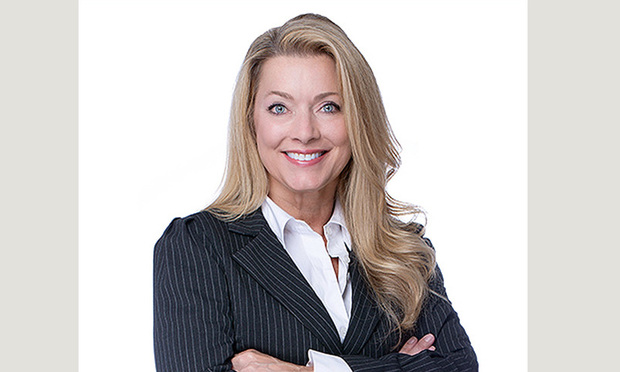Advice to General Counsel for 2020: Get Your Compliance House in Order
Pamela Davis, a white-collar crime and regulatory defense partner at Winston & Strawn in San Francisco, has served as a compliance monitor and discusses the role of monitors and some trends to watch for the coming year.
December 30, 2019 at 08:00 AM
5 minute read
 Pamela Davis, Winston & Strawn.
Pamela Davis, Winston & Strawn.
One of the most important moves general counsel can make to protect their companies is to add depth to their compliance programs, according to Pamela Davis, a white-collar crime and regulatory defense partner at Winston & Strawn in San Francisco.
Davis should know. She has 25 years of legal experience and three times has served as an independent monitor to companies that violated the U.S. Foreign Corrupt Practices Act.
Her background includes four years as a county deputy district attorney, five years with a law firm that merged into DLA Piper, 14 years with Orrick, Herrington & Sutcliffe, and nine months with Hui Chen ethics consulting, working with the first-ever former ethics consultant for the U.S. Department of Justice. She joined Winston & Strawn in September.
Recently Davis spoke with Corporate Counsel about the FCPA, the role of monitors and some trends to watch for the coming year. Here are excerpts from that conversation, edited for clarity and brevity.
Corporate Counsel: How did you become attracted to FCPA work?
Pam Davis: About 14 years ago I was working, like many attorneys, defending stock options cases. I knew those types of cases wouldn't be around for a long time. I decided to work on an FCPA case because it seemed that it would be the new frontier for DOJ.
I stuck with it, and I became known for my work on the FCPA in the [San Francisco] Bay area and on this side of the country. I built this niche.
CC: When and how did you become a monitor?
PD: I was first appointed as a monitor eight years ago, and I have been one, two more times after that. That's a lot of FCPA work in the last decade.
The company usually participates in choosing a monitor, along with the government. It's usually based on one's skill set and experience. It's a different role when you are trying to help them clean up their program as opposed to being a defense lawyer.
CC: What companies did you work with?
PD: Two were medical device companies, one was a banking technology company. I can tell you that what a health care company puts in place in terms of compliance is vastly different than, say, a manufacturer. Different companies need different compliance programs.
CC: What is your advice to general counsel on how to avoid having a monitor imposed?
PD: In the FCPA world, there are financial penalties and divesting of ill-gotten gains, but sometimes the real penalty for many companies is a monitor. That says to the world the government didn't trust that your compliance program was in place, and is not confident that you'll get it in place without someone looking over your shoulder.
The monitor helps the company improve its compliance program and has to certify that the company is ready to be on own. It's an extremely expensive process for companies, one they could have avoided entirely if they did some proactive process.
The biggest ways to prevent a monitor are to have a great compliance program in place, or clean it up sufficiently before you self-report a violation. Once your program is up to speed, you bring in an independent counsel to assess the program and you have them present it to DOJ. The general counsel can bring in help to get in front of the remediation efforts. That help can be an outside counsel, or you can hire more qualified people in-house, but you have to beef up the program.
You may even need to create a separate compliance unit that reports to the board of directors. You have to add some depth to your program if you want to avoid a monitor.
CC: What do you predict we'll see in 2020 in terms of FCPA cases?
PD: We are going to see a lot more activity in Latin America. DOJ is working closely with the Miami branches of the Internal Revenue Service and the Department of Homeland Security. We're seeing a lot of activity in Miami field offices. A few months ago, the FBI started its own anti-corruption task force in Miami. We all assume they will be targeting Latin America. It doesn't mean Asia won't still be important, but I think Latin America will be at the forefront. The three big countries will be Brazil, Argentina and likely Mexico. The Operation Car Wash and Odebrecht investigations will continue expanding in Brazil, and there are ongoing investigations in Argentina.
CC: What should general counsel know about Department of Justice enforcement policies in the coming year?
PD: In the past year many DOJ speeches focused on self-disclosure. [Prosecutors] want entities to self-report. A lot of practitioners don't want to immediately do that. I see DOJ continuing to incentivize that process.
I saw it [incentivizing] with the release of the no piling on statement. One effect is that DOJ cooperates or takes the lead and shares payment, so that multiple jurisdictions won't come after you. From the general counsel perspective, you really need to know what your risk is in foreign markets.
I also see DOJ continuing to investigate corporations but focusing on the individual. The general counsel's fiduciary obligation is to the company, not to the individuals who they might report to and who might be indicted.
Also, lately whenever a company gets off or receives a low penalty, it's due to a good compliance program. That's where DOJ will be looking. They are trying to make companies get their house in order.
This content has been archived. It is available through our partners, LexisNexis® and Bloomberg Law.
To view this content, please continue to their sites.
Not a Lexis Subscriber?
Subscribe Now
Not a Bloomberg Law Subscriber?
Subscribe Now
NOT FOR REPRINT
© 2025 ALM Global, LLC, All Rights Reserved. Request academic re-use from www.copyright.com. All other uses, submit a request to [email protected]. For more information visit Asset & Logo Licensing.
You Might Like
View All

After Botched Landing of United Airlines Boeing 767, Unlikely Plaintiff Sues Carrier
5 minute read
Inside Track: Why Relentless Self-Promoters Need Not Apply for GC Posts

Law Firms Mentioned
Trending Stories
- 1Gunderson Dettmer Opens Atlanta Office With 3 Partners From Morris Manning
- 2Decision of the Day: Court Holds Accident with Post Driver Was 'Bizarre Occurrence,' Dismisses Action Brought Under Labor Law §240
- 3Judge Recommends Disbarment for Attorney Who Plotted to Hack Judge's Email, Phone
- 4Two Wilkinson Stekloff Associates Among Victims of DC Plane Crash
- 5Two More Victims Alleged in New Sean Combs Sex Trafficking Indictment
Who Got The Work
J. Brugh Lower of Gibbons has entered an appearance for industrial equipment supplier Devco Corporation in a pending trademark infringement lawsuit. The suit, accusing the defendant of selling knock-off Graco products, was filed Dec. 18 in New Jersey District Court by Rivkin Radler on behalf of Graco Inc. and Graco Minnesota. The case, assigned to U.S. District Judge Zahid N. Quraishi, is 3:24-cv-11294, Graco Inc. et al v. Devco Corporation.
Who Got The Work
Rebecca Maller-Stein and Kent A. Yalowitz of Arnold & Porter Kaye Scholer have entered their appearances for Hanaco Venture Capital and its executives, Lior Prosor and David Frankel, in a pending securities lawsuit. The action, filed on Dec. 24 in New York Southern District Court by Zell, Aron & Co. on behalf of Goldeneye Advisors, accuses the defendants of negligently and fraudulently managing the plaintiff's $1 million investment. The case, assigned to U.S. District Judge Vernon S. Broderick, is 1:24-cv-09918, Goldeneye Advisors, LLC v. Hanaco Venture Capital, Ltd. et al.
Who Got The Work
Attorneys from A&O Shearman has stepped in as defense counsel for Toronto-Dominion Bank and other defendants in a pending securities class action. The suit, filed Dec. 11 in New York Southern District Court by Bleichmar Fonti & Auld, accuses the defendants of concealing the bank's 'pervasive' deficiencies in regards to its compliance with the Bank Secrecy Act and the quality of its anti-money laundering controls. The case, assigned to U.S. District Judge Arun Subramanian, is 1:24-cv-09445, Gonzalez v. The Toronto-Dominion Bank et al.
Who Got The Work
Crown Castle International, a Pennsylvania company providing shared communications infrastructure, has turned to Luke D. Wolf of Gordon Rees Scully Mansukhani to fend off a pending breach-of-contract lawsuit. The court action, filed Nov. 25 in Michigan Eastern District Court by Hooper Hathaway PC on behalf of The Town Residences LLC, accuses Crown Castle of failing to transfer approximately $30,000 in utility payments from T-Mobile in breach of a roof-top lease and assignment agreement. The case, assigned to U.S. District Judge Susan K. Declercq, is 2:24-cv-13131, The Town Residences LLC v. T-Mobile US, Inc. et al.
Who Got The Work
Wilfred P. Coronato and Daniel M. Schwartz of McCarter & English have stepped in as defense counsel to Electrolux Home Products Inc. in a pending product liability lawsuit. The court action, filed Nov. 26 in New York Eastern District Court by Poulos Lopiccolo PC and Nagel Rice LLP on behalf of David Stern, alleges that the defendant's refrigerators’ drawers and shelving repeatedly break and fall apart within months after purchase. The case, assigned to U.S. District Judge Joan M. Azrack, is 2:24-cv-08204, Stern v. Electrolux Home Products, Inc.
Featured Firms
Law Offices of Gary Martin Hays & Associates, P.C.
(470) 294-1674
Law Offices of Mark E. Salomone
(857) 444-6468
Smith & Hassler
(713) 739-1250






